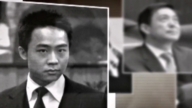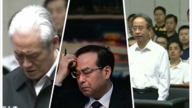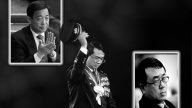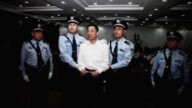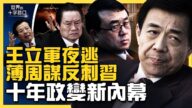【新唐人2012年4月28日讯】薄熙来事件后,中国政治情势的走向,成为海内外关注的焦点。英国媒体报导,长期以来,薄熙来的许多支持者坚决反对改革,薄熙来事件爆发,正好是中共党内改革派启动政改的良机,中共总理温家宝和他的盟友希望在中共十八大之前争取更多支持。评论人士认为,胡温要想政改,让中国百姓真正走向民主,就必须彻底清除“血债派”,抛弃中共体制的束缚。否则“薄熙来事件”成不了中共政改的起点,只是权力重新分配的起点。
《BBC中文网》引述英国《金融时报》的报导说,中共高官和接近领导层的消息来源指称,长期以来,薄熙来的许多支持者坚决反对改革。中共党内的改革派正在试图利用薄熙来倒台的契机,推进宪政改革。
美国“布鲁金斯研究所”中国问题专家李成认为,薄熙来案件是中国宪政改革辩论的转折点。要说改革会在几个月或者几年时间实现,这是天真的想法。但是现在看来正好是需要推进改革的时刻。
时事评论员蓝述表示,薄熙来倒台,整个阻挡中国进行政治体制改革,手上有“血债”的人,目前正处在四分五裂、分崩离析的状态。如果胡温有胆识,确实可以提供中国一个前所未有的和平转型机会。
蓝述:“中国目前的政治形势无疑是给胡温,突破中共目前的这个政治体制框架,进行大幅度的改革,提供了一个有力的条件。”
报导说,温家宝和改革派已经取得了战斗的胜利,但是战争还没有结束。因此,温家宝和他的盟友希望在中共十八大之前争取更多的支持。
蓝述表示,如果要改革,那么改革的第一步,就是要把手上有“血债”的那些人的权力拿回来。
蓝述:“因为所有手上有血债的人,他是不愿意看到任何层面的改革的,因为任何层面的改革,都有可能使目前把持权力的、手上有血债的这一批人,他们的利益和他们的权力受到威胁。所有手上有血债的这些人,他手上的权力是保护他们自己不受审判的一种工具,所以说他会死死的把持住这种权力。”
薄熙来事件爆发后,传出中共政法委书记周永康,是政治局常委里唯一一个反对处理薄熙来的人,中共两会期间,周永康又亲自坐镇重庆团,力挺薄熙来。
报导说,了解中共党内斗争的人士表示,薄熙来的倒台使他的支持者受到冲击,这些人物一直强烈反对西方式的民主改革,反对司法独立。这些人物包括周永康,吴邦国,李长春和江泽民。
蓝述认为,中国现在正处在一个十字路口上,必须清楚的认识到,在现行中共体制框架之内的改革,最终都不会成功。
蓝述:“因为中共的现行体制它是一个执政党凌驾于《宪法》之上的这么一个体制,那执政党的执政地位本身就是做为一种特权而存在。那么,你怎么可能最终去达到民众对权力的监督?怎么可能最终达到防止腐败?这种体制已经…整个共产主义运动100多年我们已经看到了,所有的国家都试过了,通通失败了。”
评论员杰森表示,整个中国如果没有中共这样一个政党,没有中共不断的“折腾”,中国本身是能够健康稳定的,而且高效、文明的,屹立在世界强国之林。
采访编辑/唐睿 后制/孙宁
Bo Xilai Events Are a Tipping Point
After the Bo Xilai events, the political situation in
China has become a key focus.
In UK media reports, many Bo Xilai supporters
strongly opposed Chinese reform.
Therefore, the Bo Xilai event is a good opportunity
for reformers in the CCP to start political change.
CCP Premier Wen Jiabao and his allies hope to get more
support before the 18th CCP National Congress.
Commentators believe that if Hu-Wen want to start political
reform, and move towards democracy,
they must thoroughly clean away the “blood debt faction",
and discard the shackles of the CCP.
Otherwise, the “Bo event" will change into a tipping point
for power shifts, instead of the start point for reform.
“BBC Chinese” quoted the UK “Financial Times."
The report quoted senior CCP sources saying many
supporters of Bo were strongly against reform over years.
CCP reformers are trying to use the opportunity of the Bo
event to promote constitutional reform.
Li Cheng, an expert on China issues at “Brookings Institute"
in the U.S. thinks the Bo event can be seen as the tipping point of Chinese constitutional reform.
It might be a joke to say reform will be implemented
in a few months or a few years.
However, it seems this is the moment
to push forward reforms.
Commentator Lan Su said that after Bo was removed,
the “anti-reform group" became fragmented.
If Hu-Wen have enough courage, then here is an
unprecedented opportunity for them for a peaceful transition.
Lan Su: “Undoubtedly, the current political situation in China
provides a powerful condition to Hu and Wen.
They may breakthrough the political and institutional
framework of CCP, then conduct reform."
Reports said that Wen and other reformers won the battle
but this is not the end of the war.
Therefore, Wen and his allies hope to get more support
before the 18th CCP National Congress.
Lan Su said, if (they) want to reform, the first step should be taking
back the power from the hands of “bloody group".
Lan Su: “The ‘blood debt faction’ is unwilling to see any level
of reform, because reform represents a threat to their benefit.
The power becomes a tool for the blood debt faction
to protect themselves from trial.
Therefore, they will tightly seize power."
After the Bo event, it was reported that Zhou Yongkang,
Secretary of the Chinese Communist Politics and Law Committee,
was the only one in the CCP Politburo Standing
Committee opposed to punishing Bo.
During the two sessions of the CCP, Zhou even strongly
supported Bo at the Chongqing delegation.
Reports said, people who know the CCP struggle thought
that the Bo event brought a negative effect to Bo’s supporters.
Bo’s supporters, including Zhou Yongkang,
Wu Bangguo, Li Changchun and Jiang Zemin
are always against western-style democratic
reforms and independence of the judiciary.
Lan Su thinks China is now at a crossroads.
People must have a clear understanding: any reform within
the CCP framework will not be ultimately successful.
Lan Su: “The current system places the CCP higher
than the Constitution.
This means that the ruling positions exist
as a status of privilege.
Then how could normal people supervise this power,
and how do they prevent corruption?
In fact, the Communist movement has been proved
to be a failure by many countries during the past 100 years."
Commentator Jie Sen says that China will become
an effective and civilized country without the CCP.
And Chinese people should not suffer
from so many “CCP movements".



